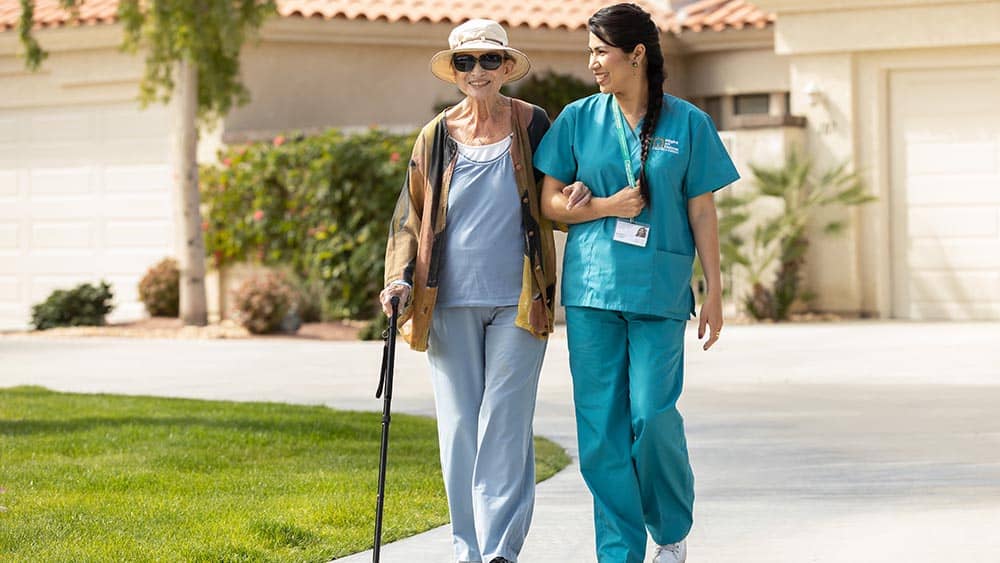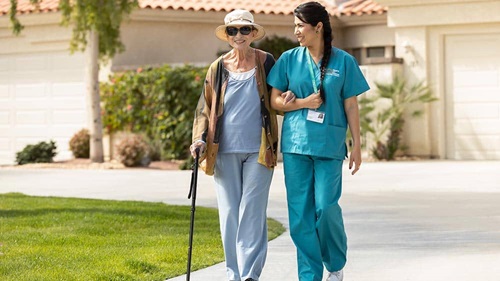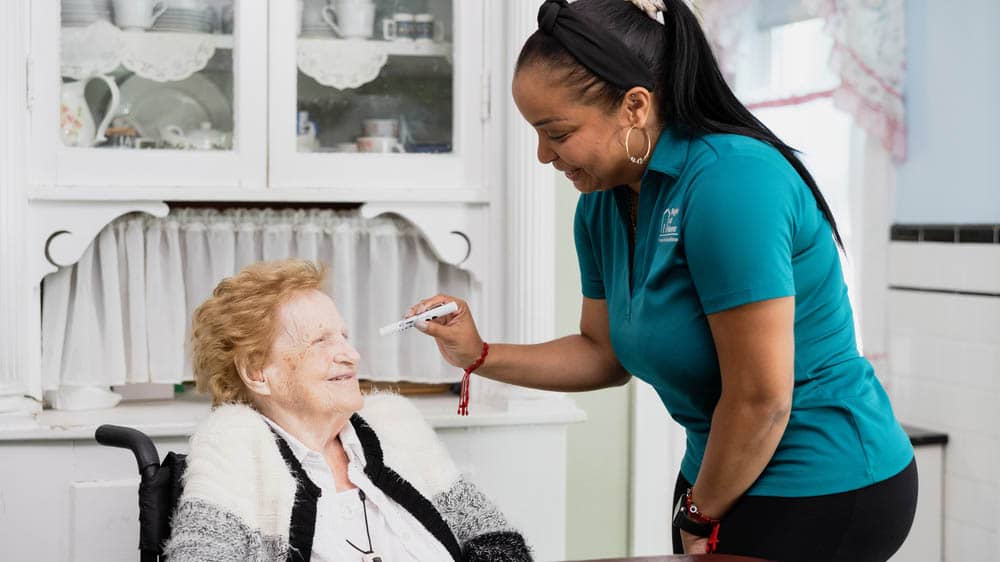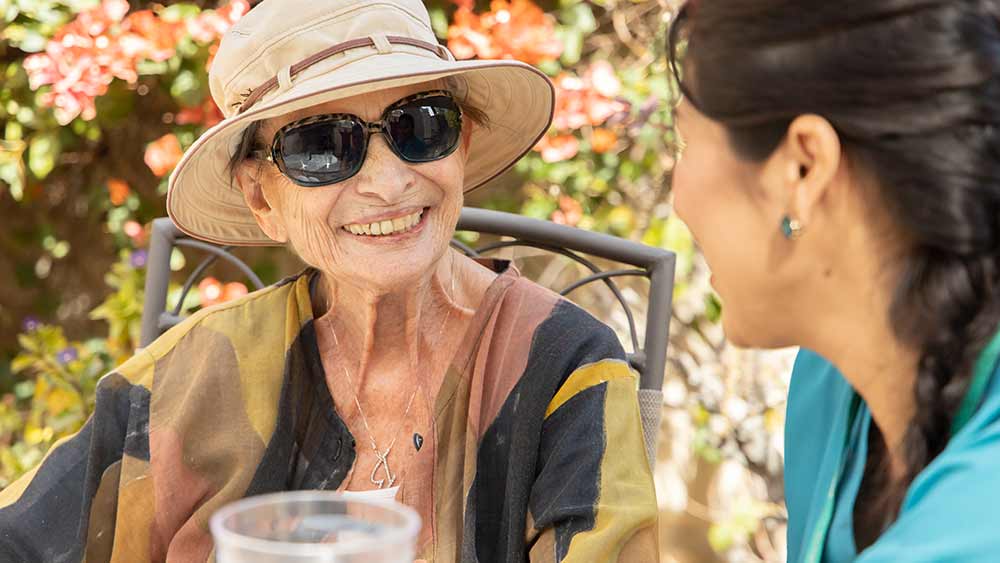

Caring for an Older Loved One With Visual Impairment
How To Make Life Easier and Safer at Home
As we age, vision loss may follow. Without proper support, it can lead to increased rates of depression and anxiety in older adults. Low vision is also linked to loneliness, social isolation, and feelings of worry, anxiety, and fear. If you know an older person you suspect has vision difficulties, here is how you can help.
How Common Is Vision Loss in the Elderly?
More than 25% of adults age 71 and older in the U.S. have visual impairment, according to a study reported in Ophthalmology Times. If you’re a caregiver, your elderly loved one may show signs of visual impairment. These signs can include:
- Taking more time adjusting to light
- Trouble seeing differences in colors
- Trouble seeing up close
- Difficulty reading
- Bumping into things
- Walking slowly
- Falling
- Erratic driving
What Can Cause Vision Loss?
Several health conditions can cause blindness or low vision. Most of them are age-related eye diseases. According to the National Institutes of Health, elderly eye conditions include the following:
- Age-related macular degeneration (AMD) can harm the sharp, central vision needed to see objects clearly and do common things like driving and reading.
- Diabetic retinopathy may occur in elderly people with diabetes. It develops slowly, often with no early warning signs.
- Cataracts are cloudy areas in the eye’s lens, resulting in blurred or hazy vision.
- Glaucoma is usually caused by too much fluid pressure inside the eye.
- Dry eye occurs when tear glands don’t work well.
How To Help Care for a Vision-Impaired Senior at Home
Besides providing general support and being a sounding board for the emotions that can come with visual impairment, there are several ways to help care for your older loved one with the condition. These include:
- Lighting. Ensure good lighting. You may want to install under-cabinet lights, which will help your senior loved one prepare healthy meals and keep them safe when they work with kitchen utensils. Keep adequate lighting in each room. Cover glass surfaces to prevent glare, and install night lights in hallways, bathrooms, and the bedroom. Keeping lights on during the daytime will balance indoor and outdoor light. Explore reading lamps with magnifying glasses.
- Minimizing falls. Help your loved one declutter to avoid tripping. Rearrange furniture to create clear pathways. Remove throw rugs. If their home has steps, consider using brightly colored tape on the edges so they know when to step up or down.
- Organizing. Organize the household by designating places for objects, such as clothing and hygiene products, and providing a basket for television remotes, keys, and cellphones. Organize cabinets for easy access to canned goods. Identify the contents with contrasting brightly colored stickers or markers, and label products with large lettering.
- Embracing technology. Choose cellphones, remotes, and other electronics with large screens and buttons. Invest in magnifying devices. Select books and calendars that have large print. Introduce your senior loved one to audiobooks. Free audiobooks are available from the National Library Service.
- Enlisting a low vision specialist. The International Academy of Low Vision Specialists can help you and your loved one find a specialist close by who will aid in making the home safe and healthy.
- In-home care. Consider in-home care. Right at Home offers care and support for individuals with low vision or blindness. Services include meal preparation, transportation, medication reminders, and companionship. Visit Right at Home to find a location near you and arrange a free consultation.
- Vision checkups. Scheduling annual checkups with an ophthalmologist or optometrist is critical in diagnosing the cause of vision loss and receiving appropriate treatment. It’s also important to keep up with visits to the senior’s primary care provider.
- Helping your loved one stay active. Visual impairment may cause withdrawal from activities and hobbies and result in loneliness and depression. Encourage your loved one to continue their hobbies and help them with visual aid tools. Help them stay socially involved. If they need transportation, give them a lift or enlist the help of family and friends. Join them at the symphony or concert. Treat them to lunch or dinner at their favorite restaurant. Give them a call or arrange a FaceTime gathering. Let them know about podcasts they would enjoy.
How Right at Home Can Help
Right at Home’s caregivers help older adults with low vision or vision loss maintain their independence by assisting with everyday living activities. Our wide range of services can be provided wherever home may be, from a few hours a couple of days a week up to 24/7 care. Download our FREE Fall Prevention Guide to get a home safety checklist to help identify areas of the home that need attention to keep your loved one safe. Or, use our office locator to talk to an aging expert near you.
Interested in receiving ongoing information, tips, and advice about the aging journey? Subscribe to our monthly Caring Right at Home e-newsletter today.







